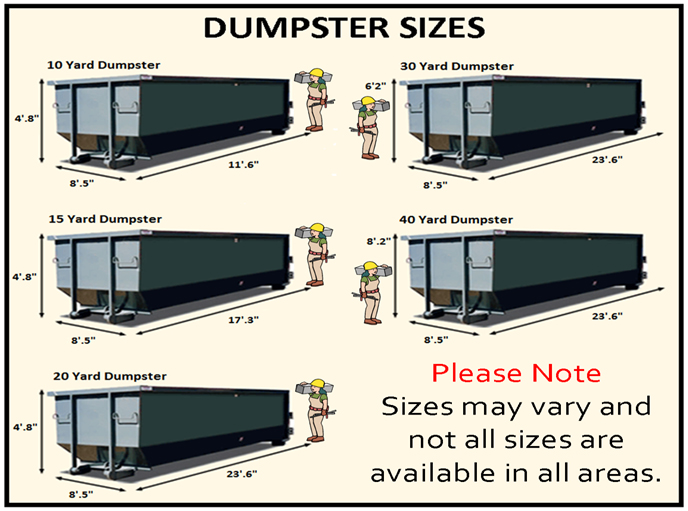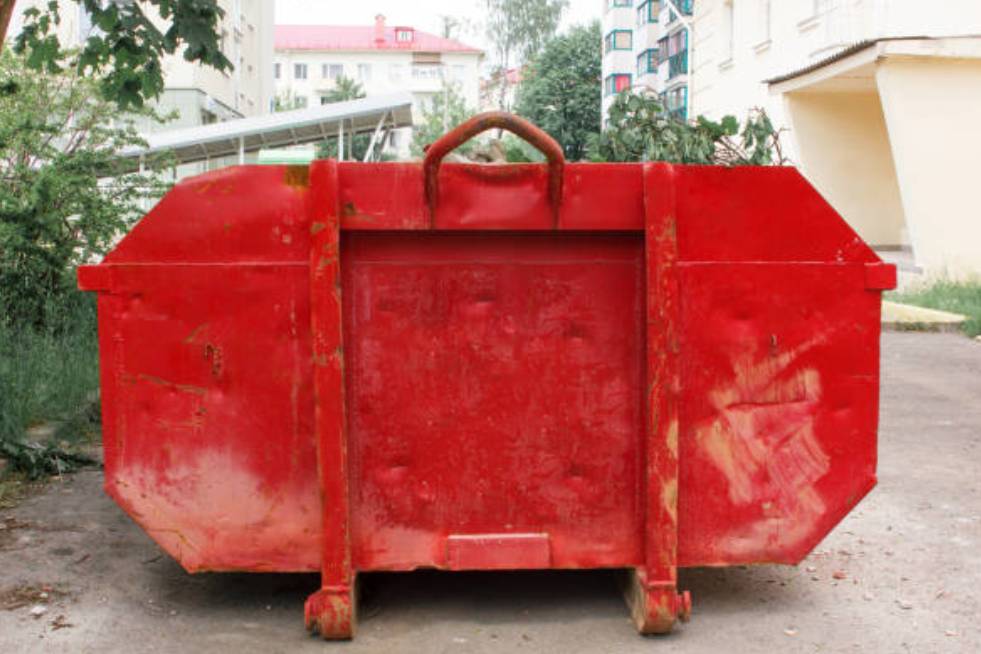
What Makes a Dumpster Rental Successful
A successful dumpster rental experience is built on numerous essential pillars, including choosing the right dumpster size and type for the task, understanding and following local regulations, and preparing for adequate room to suit the dumpster. Reliable waste administration likewise requires taking care of disposal expenses, reducing ecological effect with partition and recycling, and ensuring reliable service from the rental company. By taking into consideration these variables, individuals can guarantee a hassle-free and effective waste removal process. As you discover the globe of dumpster rentals, you'll find the value of these components in attaining a smooth and successful experience.
Choosing the Right Dumpster Size
When dealing with a large cleanup or building project, an essential facet to think about is the waste administration strategy, particularly the dumpster size
A dumpster that is as well small can bring about frequent emptying, leading to raised costs and project delays On the other hand, a dumpster that is as well large can be a waste of sources and take up valuable space on the job site.
To figure out the ideal dumpster dimension, think about the extent of the project, the sort of products being gotten rid of, and the readily available area at work site.
A general guideline is to estimate 1-2 cubic yards of dumpster area per 1,000 square feet of job location. Furthermore, take into consideration the weight and quantity of the products being gotten rid of, in addition to any type of local regulations or constraints on dumpster size.
Selecting the Correct Dumpster Type
Selecting the correct dumpster type is a necessary factor to consider combined with identifying the best dumpster size Different tasks need unique dumpster kinds to assure efficient waste management.
For circumstances, construction projects commonly demand heavy-duty dumpsters with high weight capacities to deal with large products like concrete and asphalt. On the various other hand, residential cleanouts or little improvement projects may call for lighter-duty dumpsters with reduced weight capacities.
Roll-off dumpsters are excellent for large tasks, providing ample space for mass garbage disposal. They are normally readily available in different sizes, ranging from 10 to 40 lawns, and can be quickly carried to and from the task site.
Meanwhile, compactors and recycling dumpsters accommodate specific waste administration needs, such as pressing waste or segregating recyclable materials.
When picking a dumpster kind, take into consideration the task's range, waste quantity, and product types to ensure you're getting the ideal fit. This will certainly aid maximize waste disposal, lower expenses, and boost overall project efficiency
Understanding Regional Regulations
Most construction projects involve a significant amount of waste, and dealing with it successfully is vital to keeping a clean and safe worksite.
Understanding local regulations is important to assuring that waste disposal is done properly. Failing to abide by laws can result in fines, penalties, and even project delays.
It is essential to research and understand the certain laws in your area, including what types of materials can be disposed of in a dumpster, how they should be arranged, and exactly how frequently they ought to be emptied.
Additionally, some locations may have certain policies about where dumpsters can be placed, how they must be secured, and that is accountable for their maintenance.
By taking the time to understand local laws, you can stay clear of expensive blunders and warranty that your building job runs smoothly.
This expertise will certainly also help you choose the right dumpster rental company, as they must be familiar with local laws and can offer assistance on compliance
Obtaining Essential Permits
Before commencing with dumpster rental, it is important to protect the necessary permits to ensure an easy building project.
Failure to get the called for permits can result in costly fines, project hold-ups, and even legal action. To stay clear of these issues, it's crucial to research study and get the required authorizations from local authorities before placing the dumpster on your property.
Typically, permits are needed for dumpsters put on public property, such as walkways or streets.

However, some towns may also require licenses for dumpsters on private property. The sort of authorization called for will depend on the place, dimension, and duration of the dumpster rental.

Be certain to contact your city government to determine the specific authorizations needed for your project.
Planning for Sufficient Space
Having a clear understanding of the available space is essential when preparing for dumpster service, as it directly impacts the effectiveness of the waste monitoring process A sufficient quantity of area is essential to fit the dumpster, ensuring easy accessibility and lessening disruptions to day-to-day operations.
Failure to plan for appropriate room can bring about logistical nightmares, causing costly delays and inconvenience.
When establishing the necessary room, consider the dimension of the dumpster, the area where it will certainly be positioned, and the traffic flow in the surrounding area. Ascertain the room is clear of barriers, such as overhanging cables, trees, or various other structures that may interfere with the dumpster's placement or accessibility.
Additionally, take into consideration the type of waste being gotten rid of and the frequency of pickups to establish the room can suit the volume of waste created. By planning for enough area, you can ensure a smooth and stress-free dumpster rental experience that fulfills your waste management needs.
Coordinating Distribution and Pickup
-
Confirm the delivery date and time with your provider to guarantee you get on site to get the dumpster.
-
Designate a clear and available area for the dumpster to be positioned, avoiding any type of barriers or hazards.
-
Schedule the pickup date in advance to prevent extra rental fees or penalties.
-
Be prepared to have the dumpster packed and ready for pick-up at the scheduled time to stay clear of hold-ups or added charges.
Managing Garbage disposal Costs
Effective waste management is essential to lessening disposal costs, and understanding the factors that affect these costs is crucial to staying within budget.
One considerable facet to take into consideration is the dumpster rental period, as longer rental periods can lead to greater prices. In addition, the type and size of the dumpster additionally effect disposal costs, with bigger dumpsters and specialty dumpsters for hazardous products typically being even more expensive.
Moreover, the weight and sort of waste being thrown away can additionally affect prices, as some products might require special handling or processing It is essential to accurately estimate waste quantities and kinds to guarantee the right dumpster size and rental duration are chosen.
Clear interaction with the dumpster rental supplier is essential to preventing surprise costs and ensuring a successful dumpster rental experience.
Minimizing Ecological Impact
Beyond the financial advantages of effective waste monitoring, lessening ecological influence is a vital consideration for people and services alike. The way we take care of waste can have a substantial result on the environment, and it's crucial to take actions to lower our environmental footprint.
To decrease environmental influence, consider the following:
-
Proper waste segregation: Dividing recyclable materials from non-recyclable waste assurances that recyclables are refined appropriately, lowering the quantity of waste sent out to landfills.
-
Choosing the ideal dumpster size: Choosing a dumpster that's the appropriate size for your job avoids overfilling and decreases the number of trips needed to move waste, causing reduced emissions.
-
Partnering with environment-friendly dumpster rental companies: Collaborating with business that prioritize sustainability and eco liable practices can help reduce the environmental effect of waste management.
-
Implementing sustainable waste reduction strategies: Encouraging recycling, reducing waste generation, and carrying out waste-to-energy services can considerably lessen ecological impact.
Ensuring Reliable Dumpster Service
One essential element of an effective dumpster rental experience is making certain reliable dumpster service This includes more than just leasing a dumpster; it calls for a hassle-free experience from start to finish.
A trustworthy dumpster service provider will certainly deliver the dumpster on time, place it in the appropriate place, and pick it up when set up. They will additionally offer clear instructions on exactly how to use the dumpster securely and efficiently.
Additionally, a trusted company will certainly have a team of specialists who are knowledgeable, considerate, and responsive to any type of problems or issues that may arise throughout the rental period. This includes having a dedicated client service team readily available to respond to questions and deal with any kind of troubles promptly.
Effective Waste Partition Strategies
As waste management plays a crucial role in keeping a clean and healthy and balanced environment, executing effective waste partition strategies is necessary to verify that waste is disposed of in an environmentally liable manner This entails dividing waste into various categories, such as recyclables, organics, and non-recyclable materials, to make sure that each sort of waste is dealt Kernersville, NC waste disposal options with and disposed of accordingly.
-
Identify and different hazardous waste, such as batteries, electronic devices, and chemicals, which call for special handling and disposal.
-
Designate areas for recyclable products, like paper, plastic, and glass, to facilitate their collection and processing.
-
Implement a composting program for organic waste, like food scraps and lawn trimmings, to decrease waste sent out to landfills and develop nutrient-rich soil.
-
Establish clear guidelines and signs to educate and encourage individuals to participate in waste partition efforts.